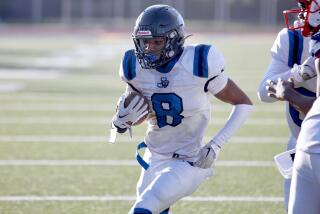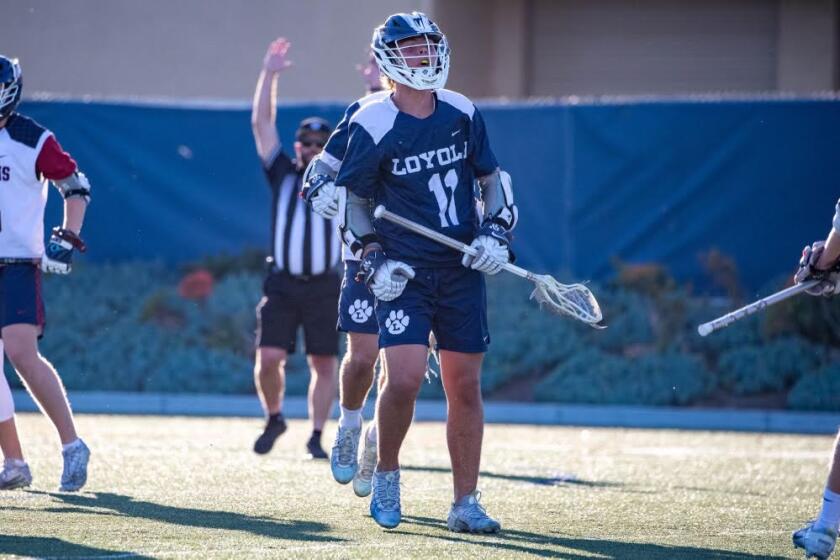Jordan’s ‘Classics’ of ’89 Beat the Odds : 170 in Watts Rise Above Pregnancy, Poverty, Gangs, Drugs to Graduate
- Share via
Leonard Jones and Zella Heyman are the sweethearts of Jordan High.
You could look it up--page 20 of the 1989 Bulldog Spirit. There are Leonard and Zella, smiling sweetly, honored by classmates as “Cutest Couple.” In the senior class popularity poll, Zella was also named “Shortest” girl.
Zella was not the only senior to hold multiple titles. Joe Hernandez collected four--”Most School Spirit,” “Class Flirt,” “Most Intelligent” and “Most Likely to Succeed.” He was not “Most Popular,” however, not with Ivin Jaspar for competition. Ivin was, after all, quarterback of the football team, homecoming king and student body president. As if that weren’t enough, Ivin’s classmates also accorded him perhaps the most coveted title of all-- “Coolest.” He is heading for the University of Hawaii on a football scholarship.
So on Thursday, it seemed fitting--after the school band oompahed its way through “Pomp and Circumstance,” after the junior ROTC color guard marched into place--that Ivin would be the first student to speak at commencement ceremonies for the David Starr Jordan High School Class of 1989.
“Please place your hand over your heart,” Ivin said, and hundreds of people did just that. “Ready, begin: I pledge allegiance . . .”
Before it was all over, 170 students wearing royal blue and white gowns would be announced one by one and would walk across the auditorium stage to accept their diplomas from a principal beaming with what she calls “Bulldog Pride.”
One day after the calendar announced the official arrival of summer, there were cheers for each, tears of joy for some.
Ivin and Joe are standouts, but there are many success stories at Jordan. There is Jesus Cervantes, who came to Jordan from Mexico three years ago with only a few words of English, but graduated as valedictorian, with a 3.8 grade point average. The point of Jordan’s commencement, however, is that every graduate is a success.
They had beaten the odds, after all, and the stereotypes that come with attending Jordan, a school with a history of enduring indignities and injustice. When the Class of 1989 entered Jordan as freshmen, they numbered 405. The attrition rate is explained partly by transfers, but mostly by dropouts prompted by poverty, gangs, drugs and pregnancies.
Jordan is located in Watts, tucked between the Jordan Downs housing project and a harsh row of scrap metal shops along Alameda Street. The 1963 lawsuit calling for Los Angeles Unified to integrate its schools was filed on behalf of a Jordan student. But when the court finally ordered desegregation in 1980, Jordan ironically was excluded from the plan, defined in bureaucratic jargon as a “racially isolated minority” school.
Today the bigger story is gangs. Jordan is located in Crips turf, but some Bloods come here too, in part because attendance boundaries encompass four housing projects. The gangs now treat the schoolyard, administrators say, as neutral territory. That is progress. Jordan officials say they are making strides academically even though achievement tests regularly rank Jordan in the lowest 1% of schools statewide.
In an address to the graduates, school board member Warren Furutani recalled, vaguely, the “adversity” of the school year. He was referring to the controversy stirred up when some parents at the Imperial Courts housing project said they couldn’t send their youngsters to Jordan because the route was too violent. The students were ultimately allowed to transfer. Then Furutani talked about Jordan’s triumph over the trouble--about Jesse Jackson’s stirring visit to campus in March, about Arsenio Hall talking up the Bulldogs on his TV show.
The Class of ‘89, those who made it, didn’t seem to see Jordan the way outsiders did. It is tradition at Jordan High for the seniors to choose a nickname and a motto for their class. This group settled on “The Classics” with the motto, “Elegance and Style.”
“What is a classic?” Jose Cervantes, class salutatorian, asked in his commencement address. “When I think of a classic, I think of a classic automobile and its originality. I think of its great performance, its reliability, its value, its excellence.
“I think of the Class of 1989-- The Classics! “
The Classics gave themselves another cheer.
Jordan Milestone
In many ways, the class of 1989 represents a milestone at Jordan. For one thing, this is the last class that is predominantly black. Jordan is now about 65% Latino, about 34% black and 1% “other,” including one Anglo sophomore who comes for a technical engineering magnet program and says he likes his school just fine. The transition of Jordan from mostly black to mostly Latino reflects in part the change in Watts and in part the expansion of Jordan’s boundaries into South Gate four years ago--when The Classics arrived as freshmen.
“We were like pioneers,” recalled Joe Hernandez. He was one of 90 graduates of South Gate Junior High who found themselves, to their trepidation, required to cross the railroad tracks and attend Jordan instead of overcrowded South Gate High.
Hernandez and his friend, Macarena Hernandez (no relation), recalled how they feared Jordan. Four years later, Macarena would share with Joe the title of “Most School Spirit.” Among the school’s top students, both have been accepted at UC Berkeley.
“I was afraid,” Macarena recalled, “but I said to myself it didn’t matter what school I attended as long as I knew what I was there for. I said to myself, what South Gate kids could do at South Gate, I could do at Jordan--and better.”
His first week at Jordan, Joe saw “a girl beat up a guy.” There were three or four fights per month on campus that first year, he says. “I was anti-Jordan. I hated it.”
New Attitude
Joe distinctly remembers the turning point. In his sophomore year, he was among about 35 Jordan students to attend a rally at USC involving several high schools. When Jordan’s group was introduced, the other students “booed us out. Because we were from Jordan.” It hurt. And Joe said he suddenly realized that he would have to change his own attitude about his school.
Still, Joe saw many South Gate friends fall by the wayside. Of those 90 “pioneers” from South Gate Junior High, Joe said, only 10 remain at Jordan. Some managed to transfer to South Gate, he said. Some went back to Mexico. Some had to take jobs to help support their families. Some dropped out.
Leonard and Zella, sweethearts since ninth grade, also saw many of their friends drift away from school.
“They see people riding around in fancy cars with lots of sound, lots of music,” Leonard said. “So they say, ‘I don’t have to go to school. I can deal dope. Easy money.’ ” Some of those friends, he says, are now in jail.
Leonard and Zella are among the Imperial Courts residents who kept coming to Jordan despite the controversy. Leonard is the second member of his family to graduate from high school. Zella is the first from hers.
“In all of my family, nobody ever made it this far,” she says. “Yeah, they’re proud. I’m proud too!”
The secret of her success, she says, “is just staying in school. That and no babies. Don’t let nobody bring you down and don’t have any kids.” A 17-year-old girlfriend, she notes, already has two.
‘No. 1 Clique’
Ivin Jaspar does not come from the projects, and neither do his three best friends--Mario Holley, Shawndel Zeigler and Nathanial Hall. They are so tight you can find them on Page 21 as “Male Buddies.” Football players all, they like to think of themselves as the “No. 1 Clique,” says Holley, who was student body vice president. They like to think of themselves as superior to the basketball clique.
Ivin wants to be a pro football player. He wants to be successful and make a lot of money. But 10 years from now, he also sees himself in business--maybe sporting goods--with Mario, Shawndel and Nathaniel. Mario isn’t so sure. He might study criminal justice and become a probation officer--”come back and help the gang members.”
Ten years from now, Macarena Hernandez sees herself working toward a doctorate in business, if she doesn’t become a lawyer.
Joe Hernandez sees himself as “an executive in a corporation. . . . My ultimate goal is to become a CEO.”
Leonard Jones plans on a four-year hitch in the Navy, learning the electrician’s trade. Zella Heyman will enter vocational school and study accounting.
And she will wait for Leonard.
Ten years from now, Leonard says, “we’ll be married. We’ll have, hmmm, maybe one kid. . . .”
More to Read
Get our high school sports newsletter
Prep Rally is devoted to the SoCal high school sports experience, bringing you scores, stories and a behind-the-scenes look at what makes prep sports so popular.
You may occasionally receive promotional content from the Los Angeles Times.






